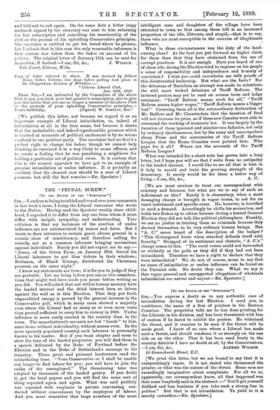THE "FEUDAL SCREW." fxo THE EDITOR or THE " SPECTATOR.")
SIR,—I confess to being troubled and vexed over your comments in last week's issue, I being the Liberal canvasser who wrote to the Nation. Having read the Spectator weekly since child- hood, I expected it to differ from any one from whom it must differ with insight, sympathy, and understanding. Your criticism is that my instances of the exertion of undue influence are not substantiated by names and dates. But I wrote to draw attention to certain grave abuses general in a certain class of constituency, and therefore calling for remedy, not as a common informer bringing accusations against individuals. Surely you did not expect me to say :— " Jones, of the Green Farm, on January 20th forced his Liberal labourers to put blue tickets in their windows ; Robinson, of Blank Grange, distributed his Christmas presents on the same night."
I know my statements are true; it is for you to judge if they are probable. Let me bring before you one or two considera- tions that might well have made you pause before writing as you did. You will admit that not within human memory have the landed interest and the drink interest been so driven against the wall as in this Election. That they put forth unparalleled energy is proved by the general increase in the Conservative poll, which in many cases showed a majority even where the Liberal had as many as or even more votes than proved sufficient to carry him to victory in 1906. Undue influence is more easily exerted in the country than in the town. The manufacturer's servants are but " hands " to him, mere items without individuality, without names even. In the more sparsely populated country each labourer is personally known to his master. But if you want chapter and verse to show the tone of the landed proprietor, you will find them in a speech delivered by the Duke of Portland before the Election and in the Duke of Sutherland's message to his tenantry. These great and puissant landowners used the intimidating tone. "Vote Conservative or I shall be unable any longer to find labour for you; you will have to join the ranks of the unemployed." The threatening tone was adopted by thousands of the landed gentry. If you doubt it, get the local papers and you will find the same sort of thing repeated again and again. What was said publicly was repeated with emphasis in private canvassing, con- ducted without concealment by the employers of labour. And you must remember that large numbers of the more intelligent sons and daughters of the village have been attracted to town, so that among those left is an increased proportion of the idle, illiterate, and stupid,—tbat is to say, those who are most susceptible to the exercise of illegitimate influence.
What in these circumstances was the duty of the land- owning class? At the best you put forward no higher claim for them than that they have abstained from the use of corrupt practices. it is not enough. Have you beard of one of them who during the Election tried to impress on his people a sense of responsibility and independence and honesty of conviction P I wish you could overwhelm me with proofs of this disinterested leadership. But what are the facts P For the delusions of Socialism an attempt was made to substitute the still more wicked delusions of Tariff Reform. The tattered posters may yet be read on avenue trees and lodge entrances : " Tariff Reform means work for all," " Tariff Reform means higher wages," "Tariff Reform means a bigger loaf." Crowning them all is the extraordinary declaration of Mr. Balfour and Mr. Chamberlain that the taxation of food will not increase its price, as if these new Canutes were able to command the working of economic law. It was largely by the iteration of these ignorant and mischievous fallacies, not only by ordinary electioneerers, but by the noisy and unscrupulous cheap Press and the mercenaries of the Tariff Reform League, that the Home Counties were painted blue. Who pays for it all P Where are the accounts of the Tariff Reform League P What was intended for a short note has grown into a long letter, but I hope you will see that I write from no antipathy to the landed interest. I would like to see all that is best in it help to mould and train the growing strength of the democracy. It surely would be for them a better way of [We are most anxious to treat our correspondent with courtesy and fairness, but what are we to say of such an indictment as this ? Surely it is elementary, when a. most damaging charge is brought in vague terms, to ask for an exact indictment and specific cases. He, however, is horrified at such a demand. Accordingly he shifts his accusation, and holds two Dukes up to odium because during a heated General Election they did not talk like political philosophers. Frankly, we see no justice in treating them as criminals because they showed themselves to be very ordinary human beings. Has "A. C." never beard of the description of the badger? " This ill-tempered brute when attacked defends itself with ferocity." Stripped of its sentiment and rhetoric, " A. C.'s" charge comes to this. " The rural voters could not have acted so wickedly at the polls as they did if they had not been intimidated. Therefore we have a right to declare that they were intimidated." We do not, of course, mean to say that no cases of intimidation or undue influence can be found on the Unionist side. No doubt they can. What we say is that vague general and unsupported allegations of wholesale intimidation are untrue and unjust. —ED. Spectator.]










































 Previous page
Previous page